| Article Overview:
What's it like on the eve of war? What's it like to prepare to
die? As a former Marine who landed in Vietnam in 1965 and
went on 100 combat operations, I relate to the feelings of Task Force
Tarawa, the U.S. Marine unit etching out the rules of death for
themselves and their enemies. Find out how "The Few.
The Proud." prepare to die so others can live. |
 VigilanceVoice VigilanceVoice
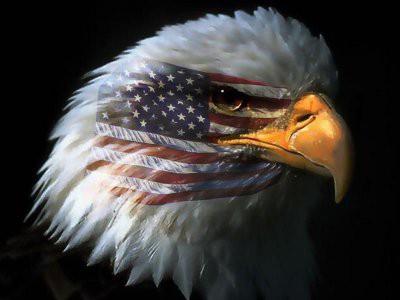
www.VigilanceVoice.com
Friday--March
14, 2003—Ground Zero Plus 548
___________________________________________________________
Task Force Tarawa: U.S. Marines Preparing To Die
___________________________________________________________
by
Cliff McKenzie
Editor, New York City Combat Correspondent News
|
GROUND ZERO, New York City, Mar. 14--Unlike most military
organizations, the U.S. Marines are trained to die. They're
getting ready for death as the War Clock ticks in Iraq, preparing not
only for their own deaths, but the deaths of many of their enemies as
well.
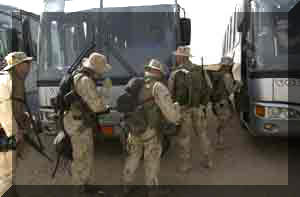 |
|
Marines part
of Task Force Tarawa getting on busses |
Task Force Tarawa comprises 4,000 Marines
poised on the border of Kuwait and Iraq, itching to launch their
killing machine against the enemy. Each Marine is a volunteer
whose body and mind has been finely tuned and toned to deliver death
and to accept it.
On November 10, 1775 the Continental
Congress raised the Marine Corps to life. Since that day,
it has been "first in and last out" in most conflicts.
Unlike most warriors in the American military, dying for the Corps,
the Country and one's fellow Marines is the highest honor.
In a recent New York Times
article by Michael Wilson, the reporter describes how the Marines are
instructed to deal with death in many different formats.
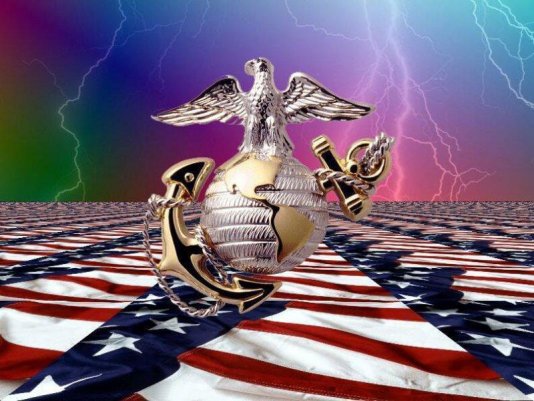 |
|
November 10,
1775 is the birthday of the United States Marine Corps |
If the Marines bury their
enemies, they are advised to insure the body's head faces southwest,
toward Mecca, out of respect for Muslim traditions.
Marines have a unique bond with their enemy--they accept they are
brave warriors like themselves, and generally give them the respect
they would expect.
Mortality squads are also being
formed to haul dead Marines from the scorching battlefield.
Rotting corpses are a problem
in a hot, sweltering desert. To limit decay, Marines are
trained to cover or bury the dead if they cannot be extracted.
They are told to carry their personal items in a Ziploc bag stored in
a flap pocket on their legs so it can be quickly cut and removed from
their dead body. Each wears two dog tags, one around his neck
and the other in his boot in case body parts are separated. This
provides them two forms of identification.
Gruesome? Morbid?
Frightening?
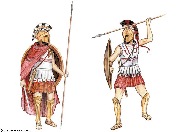 |
|
Spartans AKA
Marines |
Not to a Marine.
All Marine training is geared to
killing and being killed. Death becomes second nature to a
Marine long before he hits the battlefield. The purpose: so that
when his buddy is blown to bits next to him he doesn't stop or
hesitate, but instead charges even more ferociously toward the enemy.
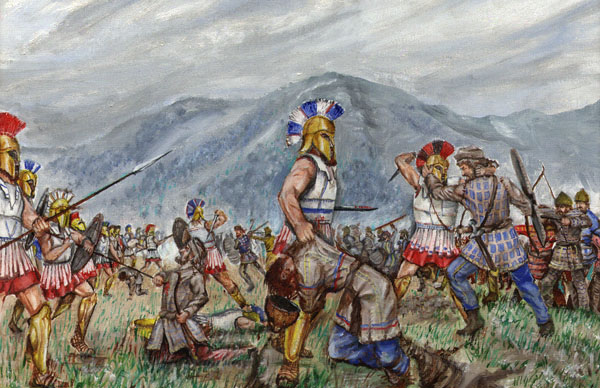 |
|
The Battle of
Thermopylae - Marines follow the legacy of the Spartans |
Marines follow the legacy of the Spartans,
who thousands of years ago turned back enemies outnumbering them by
hundreds to one because of their fierce fighting and fearlessness of
death. In the famous battle of Thermopylae, for
example, 300 Spartans held back over 14,000 Persian warriors for three
days, enough time for their main force to be reinforced.
The Japanese ninja is also a
part of the brotherhood to which Marines cleave when facing death.
Under "the way of the warrior," the ninja is taught that he is already
dead, and since he is already "dead," he cannot therefore fear death.
Thus, he becomes mentally invincible, able to surmount his Fear,
Intimidation and Complacency of death. This state of mind
converts the negative energy used to protect one's self from harm into
precision killing force against any and all enemies.
Marines tend to think in such
"invincible" terms regarding death.
They aren't suicidal about it, but
they are homicidal. They would far rather stand on a pile
of bodies and have their picture taken than be stood upon by the
enemy.
But they're aren't without
humanity.
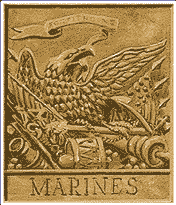
|
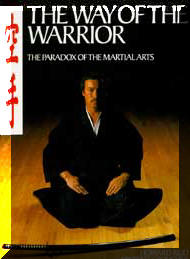 |
|
Marines learn
from the philosophies of Ninja Warriors to surmount Fear and not fear death |
Marines may be the professional
killers of war, but the retain the power of humanness.
They respect their enemies
rather than demean them. They "dance like the butterfly
and sting like the bee," as Muhammad Ali, America's most precision
pugilist chanted before his famous ring battles.
When the smoke clears and the
bodies are counted, Marines salute their dead. To a
Marine, war is the Olympics of Life and Death, and like the Olympics,
one can only achieve the highest results if one pays honor to one's
competitors, both prior, during and after the competition.
That's why they'll bury
many of their enemies facing southwest.
In Vietnam, I witnessed
many horrors of war, as any combat veteran does. I also saw many
moments of glory. The highest were when we gave respect to
the enemy.
One of the most honored
enemy I witnessed was a Viet Cong who tied his body to his machine
gun. He laced ropes around his waist to keep his body from being
blown away from behind the gun, and also tied his fingers to its
triggers. While his unit retreated, he laid down covering fire.
He sacrificed his life for his buddies. Even though his body was
riddled with countless bullets, and parts of him blown entirely away
from his torso by hand grenades and mortars, he continued to fire,
using his last ounces of life to deliver as much death as possible
upon us.
He was given a solemn but
honored salute for his bravery and courage, even though he delivered
deadly blows to a number of our fellow Marines. He was a brother
in death, an equal warrior in courage.
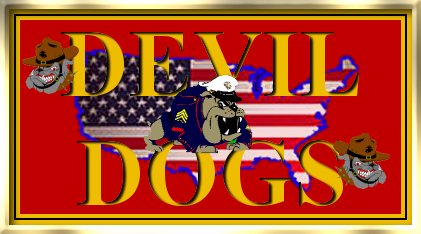 |
|
In the Boxer
Rebellion Marines were termed "devil dogs." |
Marines are the exceptional warriors because they are trained to
"expect the unexpected." They do not presume the enemy
will run. They know better than to underestimate him. That's why
they attack as though they were sent from Hell, individual energy
magnifying each warrior by ten times.
In the Boxer Rebellion in
China, Marines were termed "devil dogs" because they screamed and
barked as they charged, often intimidating the enemy and sending them
running thinking banshees from hell were attacking. "They
sounded like dogs from hell," one Chinese warrior said.
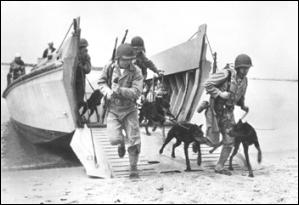 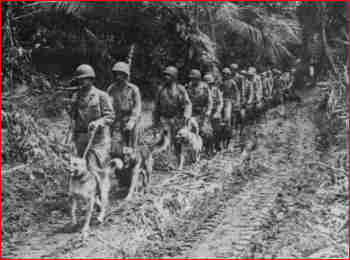
|
|
The Marines
utilize the largest K-9 force used in military operations |
Later, in 1935 Marines
started to employ K-9's, and amassed the largest K-9 force used in
military operations. Marines used dogs as sentries and
scouts in World War II, adding to their legend as "devil dogs."
A Marines' bark, it is said, is a tenth the power of his bite.
Today, the Marine devil dogs are
barking. The rallying cry around Task Force Tarawa
is "Get Saddam." It isn't, "Kill Iraqis."
Marines know the target is unseating Saddam, not killing civilians.
If their actions can intimidate the enemy to surrender, that will be a
great victory. If not, they want everyone to get out of their
way as they head to Saddam's lair
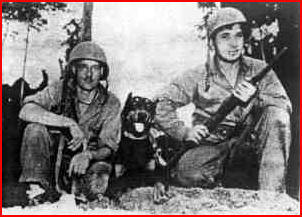 |
|
Marine devil
dogs are barking to "Get Saddam." |
As I perused the article in the
Times, I recalled my own preparations for death. I
was glad I chose the Marine Corps because when I went to war the fear
of death had been driven out of me in boot camp. What took
its place was my willingness to die for a cause. I truly
believed my death--if it happened--would be to insure the freedom of
others. There is no higher glory than that, despite what war
protestors might think.
It is reported that Mahatma Ghandi
once said that an act of violence is better than doing nothing.
While he wasn't promoting violence per se, he was contrasting the
worst possible sin--that of Complacency--where one sits and watches or
ignores the pain and suffering of the world and is inert to it all.
Ghandi's words are echoed by Winston Churchill who said: "Stand For
Something Or Be Nothing!"
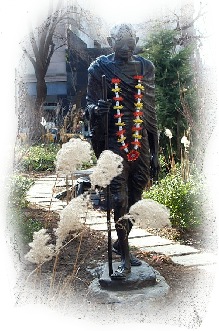 |
|
Ghandi was not
a proponent of Complacency |
In some ways, the U.S. Marines
example the extreme of violence in a world of Complacency. And
certainly, they "stand for something." Each Marine is
trained to die for a cause that extends far beyond the benefits of
life. Being willing to die for the freedom of strangers in
a foreign land is a high ideal. It needs to be, for it must robs
one of the most primary desires of all human beings--personal
survival.
Extruding the desire to live out of a
person is not an easy task. While many people boast
of their willingness to die for others, in the final moments when the
bullets are flying or the Beast of Terror roars so loudly it shakes
the earth, many flee. The fear of death overpowers the
willingness to die.
Cowards are born many fold on such
days.
But so are heroes. Marines are
trained to be heroes whether they want to be or not. They are
trained to stand up to the Beast of Terror by screaming and growling,
charging him as though they were invincible to his fangs, claws and
jaws. Bravery is a habit for them, not an occurrence.
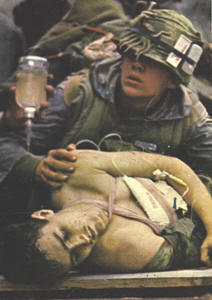 |
|
We are often
blinded by the blood and guts of war's horrors |
In war, we are blinded often by the
blood and guts of its horrors. It's hard to see the glory of it
all, or to promote and extol its virtues--those small but vital
elements where a U.S. Marine digs a hole and buries an enemy facing
southwest, in honor to his fallen counterpart's heroism to fight and
die for his beliefs. It's hard sometimes to envision a Marine
kneeling in prayer before battle, hoping he won't have to kill anyone
but knowing that if he has to, he will kill with precision and
thoroughness.
It's hard to imagine a Marine
crying when he comes across the body of a noncombatant, killed in a
crossfire, but he does.
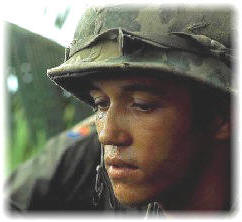 |
|
It's hard to
imagine a Marine crying |
Marines,
despite their affinity to deliver death, are human beings, perhaps
more sensitive to death and its horrors than any peace protestor could
imagine.
Marines have a history of
sacrificing their lives in foreign lands for others.
A hundred and ninety-nine years
ago a small band of Marines, six to be exact, attacked the Barbary
Pirates in Tripoli with the aid of local warriors
They demolished the "Terrorists of the Time" with the same alacrity as
the present in Task Force Tarawa. Their mission was
to remove the Terrorism of the Sea, and to free Americans held captive
by the pirates. They were willing to die so a fledgling
nation, then under command of President Thomas Jefferson, would not be
held hostage by pirates.
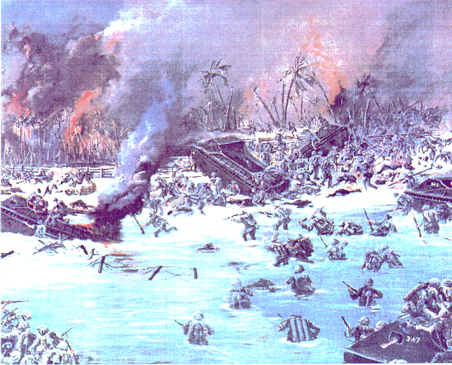 |
|
Task
Force Tarawa is named in honor and respect for the Battle for
Tarawa on November 20, 1943. 5,000 Marines died in the
raging, bloody battle that took them 76 hours to capture a
Japanese airfield on the tiny pacific island in the Tarawa Atoll. |
Today, Task Force Tarawa is poised on a similar mission. Despite
all the protestations against war, I can assure readers the vast
majority of Marines about to face death are willing to die for the
safety of future generations, not only in America, but in the Middle
East and around the globe.
There will be many who try
and make the Task Force Tarawa Marines ugly vultures of war, and, as they did me, spit
upon them as symbols of American belligerence and violence.
How wrong such people are.
Marines are Sentinels of
Vigilance. They fight and die for people's children.
In Iraq, they will die for liberating the people from Saddam Hussein's
tyranny.
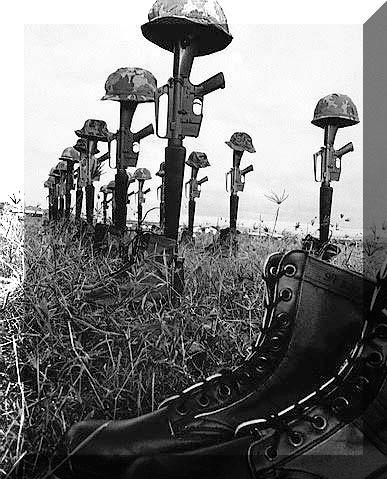 |
|
Marines are
Sentinels of Vigilance |
While
the opposition to war may scoff at that idea, they do
so from their armchairs. They scoff in the
safety of a land that allows diverse opinion and free
speech. They scoff from the safety of homes and
television sets and fast-food outlets.
They
know little about fighting for things, for unless one
is willing to die for his or her cause, they have offered
nothing.
The Marines
are offering their lives. They are willing to strike
blows at the Beast of Terror and remove one more fang
from Terrorism's jaw.
I salute
them. And so do the children of Iraq who will benefit
from the freedoms they bring.

Mar. 13--The Serbian Mandate:
It's Crunch Time For Terrorism
©2001
- 2004, VigilanceVoice.com, All rights reserved -
a ((HYYPE))
design

|
| |
|
|